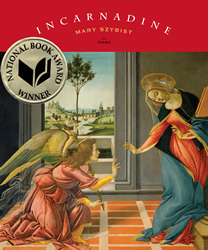Notable Books (NW) – Reviews of Mary Szybist, Robert Wrigley, Nance Van Winckel, and more
NOTABLE BOOKS (NW) – Fall-Winter 2014
The reviews included in this feature section were first published in our fall-winter 2014 print issue.
Incarnadine, Mary Szybist (Graywolf Press, 2013)
Readers have waited a long while for Mary Szybist’s second book, Incarnadine, and that seems right. In an age of gush and glut, Szybist works patiently; her poems exude painstaking care, every line fleshed out (or broken), every word placed (or erased), just so. I mean this quite literally: titles like “How (Not) to Speak of God” and “On Wanting to Tell [ ] about a Girl Eating Fish Eyes” demonstrate how in Szybist’s hands words both fill and empty out the spaces they occupy (in the breath, on the page).
The effect is helped by the lovely, large-format book design, which amplifies the white space around each poem. And concrete instances, like the sentence diagram “It Is Pretty to Think” or the aforementioned star-shaped “How (Not) to Speak of God,” embody the lyrical impulse to make the felt world visible with persuasive tact. But this is just the trim around the edges. With couplets, quatrains, quoted text, prose poems, erasures, sonnets—Szybist avails herself of a multitude of forms in her quest to approach the unsayable without distraction, to “feel without exaggerating anything.” Fresco technique comes to mind: the compact work of days and details accumulating mass, gathering vision, the parts pursuing a greater whole.
And what a vision: “Duccio’s subject is God’s entrance into time,” she notes in the prose poem “Entrances and Exits,” and so is Szybist’s. She documents these divine coming and goings as a recurring series of annunciations—“Annunciation (from the grass beneath them),” “Annunciation as Nabokov and Starr”, etc.—which find their increasingly urgent exegesis in both the quoted and the quotidian, the ordinary and the miraculous, the sacred and profane.
It is also a book about middle life and its various unfulfillments: “Mary always thinks that as soon as she gets a few more things done and finishes the dishes, she will open herself to God.” Indeed, “Mary” appears not only as a figure in paintings, a Biblical character, but also as a girl on a playground, a lost hiker, and an occasion for self-study, among other manifestations. This cross-referencing is exhilarating: Szybist personalizes the confusions of physical love and spiritual longing with tender audacity, a tonal balance few other poets of her generation can match.
Underwriting the ache to know God is the pain of self-consciousness, alongside the terror and appeal of self-annihilation, enacted throughout the book in plainspoken, often elegiac lines, now for a dying mother, now for a distant lover, now for a mother who commits infanticide, not to mention for childlessness, the inability to conceive, for “the angels of barrenness and bliss” alike:
Spirit made to
know me, is this your weight
in my throat, my
chest, the breath heavy so I hardly
breathe it?
In their steady questioning, Szybist’s lines grapple with the costs of inspiration and aspiration alike. But her touch is light, even where it picks up echoes of G. M. Hopkins. “Knock me or nothing, the things of this world / ring in me, shrill-gorged and shrewish…” begins one concluding poem (“Knocking or Nothing”) that comes as close as any to ontological bedrock, a manifesto of the living spirit yearning to ensnare, if not embrace, the wide, unknowable voiceless void, to rescue from it some echo of divine presence:
Oh my out-sung, fierce, unthinkable—
why rattle only the world
you placed in me? Won’t you clutter the unkissed,
idiot stars? They blink and blink
like quiet shepherds,
like brides-about-your-neck.
Call them out of that quietness.
Knock them in their nothing, against their empty enamel,
against the dark that has no way to hold them
and no appetite.
Call in the dead to touch them.
Let them slip on their own chinks of light.
In that slippage is Szybist’s gift: the stars can slip and fall away from us, or they can slip on light like a chink-ridden shawl. That she can hold both possibilities together in one quiet, unassuming phrase is testament to Szybist’s vision and her faith in the reader. You will find no finer book this year in which to take your waking slow.
– Kevin Craft
*
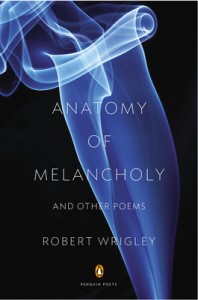 Anatomy of Melancholy and Other Poems, Robert Wrigley (Penguin, 2013)
Anatomy of Melancholy and Other Poems, Robert Wrigley (Penguin, 2013)
An eminent southern editor once instilled in me a belief that poems ought not allude to other poems. Impressionable and eager to please, I began to compose according to that odd ordinance. Better I had taken cues from Robert Wrigley, whose eloquent excursions in this book reference many of his predecessors, all while managing never to come off as chummy, privileged, or showy in the erudition. In this book we find a tender ecology of poetic voices to which he lends his own.
Wrigley’s title poem borrows its theme from the quirky medical treatise by Shakespeare contemporary Robert Burton, and presents a riveting tale of mournful misfits who labor at a trash dump. One misfit, overwhelmed by a melancholy alluded to but never defined, ends his life in a peculiar fashion. Or so we think. One feels the force of both parable and ambiguity in the telling, since Wrigley is a master of the complex sentence folded deftly against the rhythm of each line.
Referenced elsewhere are Stanley Kunitz, Philip Larkin, Christopher Smart, Rene Descartes, Herman Melville, John Keats, Anne Sexton, Gerard Manley Hopkins, and Edwin Arlington Robinson – a colloquy of precursors that functions as a chorus for the poet’s interior life.
What pleases most in this robust book, though, is not allusion for its own sake but the audacious range of tones. A single poem might wax playful, sensual, or philosophically dense by turns. Homages to lovers and parents, satires of academic folly, frolics with antique language, and abiding esteem for wild and domestic animals enrich each reading anew. Wrigley moreover demonstrates the rare ability to activate laughter, as in these lines, resounding like snare drum and cymbal clash, that open “Babel”: “The language he speaks and writes is spoken / and written by no one but him, which solves, / for him at least, the problem of audience.”
If there are Wrigley signatures evident in this, his ninth book, fidelity to language music and love for the great outdoors rank high among them. The poems are mostly patterned in stanzas, often irregularly rhymed, always sonically lush, syntactically provocative and complex. Images compel on visual and auditory levels alike. “Sun off a smolt in the kingfisher’s beak / is a jewel its wings can live by,” shines metrically in “Now Here,” a poem composed almost purely as word-music. Of a pet hen snatched and plucked by an owl, he writes, “the new night wind spins up a leghorn ghost.”
Given the rustic settings of so many of these poems, echoes of Robert Frost might be inevitable at times, as in these lines about a bear: “He’s too close here and ought / to find another stump to ravish.” Or, “there’s the clang of the triangle my wife uses / to call me back from wherever it is I’ve gotten to, / as per our arrangement: that I might return.” But there is also an interest in animism that runs deeper than anything Frost entertained. Trees have lives worth saving and savoring. “Triage” opens the book, concerning the rescue of a storm-bent aspen that the speaker dresses, addresses, and convalesces with. There is likewise “Dream of the Tree,” echoing the Anglo-Saxon “Dream of the Rood.” Most compelling among these seeming pagan treatises is “The History of Gods,” which gives serious consideration to the sentience of redwoods. More than mere personification – finding our likeness in an alien world – these poems recalibrate our sympathies with the natural. Wrigley proves himself a memorable successor to poetic traditions that make a civilization of wilderness, a wilderness of civilization. His is an intimate, innovative voice that calls us back to our roots.
– Paul Lindholdt
*
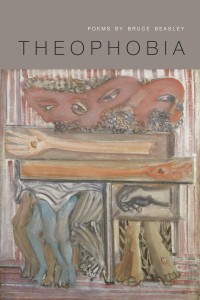 Theophobia, Bruce Beasley (BOA Editions, 2012)
Theophobia, Bruce Beasley (BOA Editions, 2012)
The gods feared in Bruce Beasley’s brilliant, ambitious new collection, Theophobia are the gods we have created to replace the pre-enlightenment pantheon. Science and Technology, those terrible deities whose bidding we do in our smallest daily observances—dialing customer service, looking something up on Wikipedia—are the gods we unwittingly cry out to in the wilderness they, in fact, have created. In an early poem in Theophobia, “Year’s End Paradoxography,” there is pathos in the speaker’s asking for a “live person” on a customer service line and receiving the maddening robotic response: “Hmmnn…I’m not sure I got that.” In “Having Read the Holy Spirit’s Wikipedia” the speaker addresses a holy “You” in the only way, apparently, that can make sense to him given the readily-accessible evidence that our experiences are largely determined by brain chemistry:
If You’re in me I don’t feel it.
Say Your verb, Your let-there-be
deep in my amygdala’s fear-circuits, speak in me
through the X of Lexapro, its
self-cancellable crux:
tell me about light-from-light, serotonin-
from-synaptic-cleft, tell something about a long
half-life and Your charged
indwelling in the cells.
As is evident from this passage, Beasley’s language in this collection is hyper-charged with alliteration, consonance, and internal rhyme, and wound tight as a spring through the spiraling enjambments of variously-long lines. And, while Beasley discovers gorgeous music in a number of esoteric dictions—clerical latin (Nihil obstat), genetic code (UUU for phenylalanine), biomedical trade-marking (OncoMouse)—a pervasive anxiety in the collection seems to be that language will come to possess the speaker, that he might become a mere output of its information.
Indeed, in the beautiful “‘Behold I Am Against the Prophets,’ Saith the Lord, ‘Who with Sweet Tongues Say, “The Lord Saith,”’” the revelations of Ezekiel and Moses are likened, in a wonderful conceit, to a parasite that destroys and replaces the tongue of the red snapper, then feeds on what the snapper eats. How, then, can we possess language before it takes parasitic possession of us? What if, as in “Self-Portrait in Ink” we become like the octopus who jets out an inky decoy-self to fool the attacking shark and then goes transparent as the water beyond and is unable to be found? What if, as in “Stray Apostrophes” and “Reading the Unwritten,” we use language to imagine a refuge of unscripted (or unscriptured) meanings beyond language?
In Dialectic of Enlightenment, Adorno and Horkheimer diagnose what in the wake of scientific rationalism has come to replace the fear of nature and of God: “The noontide panic fear in which men suddenly became aware of nature as totality has found its like in the panic which nowadays is ready to break out at every moment: men expect that the world, which is without any issue, will be set on fire by a totality which they themselves are and over which they have no control.” Beasley offers a stay against such fear through a scrupulous, hard-won book of “Pilgrim Deviations” (a name given to the opening poem of each of the book’s six sections)—deviations from the language that would annihilate us by absorbing us into its totality.
And yet, while Beasley offers hope of becoming alive to the intensity of the shimmering present through the language of these poems, he provides no easy absolution. These poems are difficult, their gnarled syntaxes and encyclopedic vocabularies demand from us that we be at our best as readers, that we muster something of ourselves to overcome the terror of our current predicament. And that rewarding difficulty is precisely what makes this book necessary—it demands that we participate in its project of imagining how to be resilient, how to be larger.
– Brandon Krieg
*
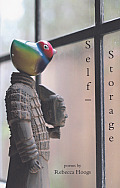 Self-Storage, Rebecca Hoogs (Stephen F. Austin University Press, 2013)
Self-Storage, Rebecca Hoogs (Stephen F. Austin University Press, 2013)
Rebecca Hoogs’ Self-Storage unit holds not just Vestal Virgins, a riddle, an autobiography of silence, and an octopus. It also contains an irrepressible sense of fun—suggesting the boundless twists and turns a multiplicitous life can take. From the evidence of this bountiful debut, Hoogs’ would never be satisfied by mere autobiography alone. Her many selves include Miss Scarlet—“weapon without a playing piece”—in the Billiard Room, and “Shelley’s Jaw”: “A piece of bone holed up in a jam jar / thinks he’s not half the jaw / he used to be.”
Self-Storage moves through three sections in seventy-eight pages. The first and third contain shorter, humorous poems. The second is one long poem in thirteen parts, twelve of which start “For example”—as if identity consists mostly of conjured instances, and the self exists to be made an example of.
Throughout the book, Hoogs capitalizes on concision and double-entendre to enlarge her self-referential range. This tension is sometimes wry and sometimes thrilling. So “Daphne in As The World Turns” begins: “I lived a pastoral existence: / meadows and mead and suitors swimsuited.” Later, in “After After Song” she writes: “At heart / there’s half a laugh, / and in the / half-hearted, / even less than that.” Likewise, lines like “round bales / bound in white plastic like downed clouds” exhibit the exactness of her vision.
Despite this playful economy of expression, Hoogs can spin a mythic tale. There’s wry appreciation for the plights of Ariadne and Persephone, yes, but Hoogs also takes a larger view in poems such as “This Myth,” and “Epic Poetry.” She reminds us that, while the epic can be reduced to “Love” and “Tragedy,” myth is small, recurring, changing. It “is about a girl lounging naked—/ just another day in the glade—waiting / for her fifteen minutes of transformation.” It lives inside us always, taunting or threatening or imploring us with metamorphoses, whether we wish for them or not:
Just this once, let’s be
of mythological proportions,
the best words in the best order,
fumbling for the other’s buttons.
This is, in a nutshell, what Hoogs is up to in Self-Storage. Like the “old woman echoing the lovely once,” she updates abiding truths with the best words for our time. At the same time, she probes the vulnerabilities and foibles that complicate, and compound, identity. “We say in sum to summon some kind/of meaning,” she writes. In Self-Storage, she summons it, and it comes.
– Carrie Kahler
*
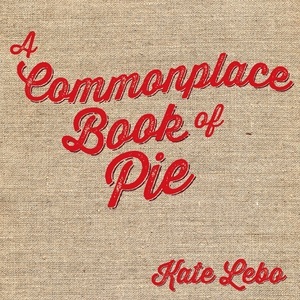 A Commonplace Book of Pie, Kate Lebo (Chin Music Press. 2013)
A Commonplace Book of Pie, Kate Lebo (Chin Music Press. 2013)
With her debut book, Kate Lebo has written a smart new life of pie. A Commonplace Book of Pie is a little of what you might expect and a lot of what you wouldn’t. A compendium of sorts, it’s part cookbook, part horoscope, and part auto-pieography. Indeed, Lebo’s series of prose poems reinvents the relationship between pie and baker and what we know and assume about both. From the woman who makes mincemeat, to the legend of lemon meringue pie, Lebo explores the magic of “the only food that can hold itself.”
In the process, she creates a world in which pie and the people who eat it are bit larger than life. While many of her poems work around and within inherited or cliché notions of pie, femininity, and domesticity, they always surpass their most basic ingredients, in humorous, wry, and sometimes dark ways:
Hello cranberry pie-lover. Your lights are light because your darks are dark, bog-like, ballooned. Where your rivers break into lakes, weeds silk the dark water. Do you wonder how it feels to back-float in a cranberry field, cerise fruit bubbling up your arms’ lazy windmill?
Framed by rules of thumb for the potential baker, the language is rich and sensuous, and often reads as an instruction manual for living a more vibrant, flavorful life. In addition to the poems and recipes, the book includes many appetizing watercolor illustrations from Jessica Lynn Bonin, which depict the baking process from start to finish. In Lebo’s hands pie is art, poems are pie, and both are edible and meant for sharing. – Kim Kent
*
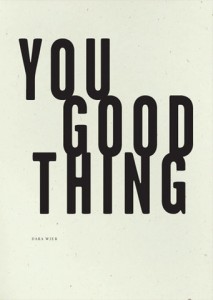 You Good Thing, Dara Wier (Wave Books, 2013)
You Good Thing, Dara Wier (Wave Books, 2013)
The latest from Dara Wier is You Good Thing, a high-pressure rocket of a book for which the combustible of choice is the sonnet, that most enduring and exalted form of lyric address. Wier takes the form and demolishes it, leaving nothing unscorched save for the fourteen line chassis and the smoldering hint of a turn.
What we find when the smoke clears is forty-two complex and subliminal new poems, poems that recall the work of Ted Berrigan in their diverse techniques and virtuosic invention. Wier wields language with such adroitness that even her boldest experiments magnify. Jolted out of an easy narrative, words, phrases, and images slide individually in and out of focus. The formal elements of the verse come to the fore as well, as in a painting by Helen Frankenthaler, where the prominence of color, shape, and value absolves the work of the need to represent something fixed. In Wier, verbs become nouns, metaphors unseat the metaphorized, and line breaks fold sentences, origami-like, into a myriad of possible meanings.
One of Wier’s foremost concerns in You Good Thing seems to be testing the limits of poetry, of what and how a poem can say. “Where do we next go, how will we get there?” frets the speaker of one poem, “Oblivious Conclusion.” “Where will we fit in, and what will we do with all we’ve outgrown?” You Good Thing provides an answer—or many answers—to these questions. Through associations, intimations, and appositions that teeter on the brink of the nonsensical, these poems invoke real emotions, familiar states of mind, and universal dilemmas, turning up insights and resonances because—not in spite—of their opacity. This book’s success lies in the way it ignites ordinary language and then freezes the blast for us to examine. It’s a feat worth considering, for while explosions rarely say anything, they can mean many things indeed.
– Jack Chelgren
*
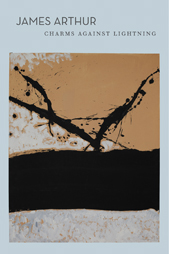 Charms Against Lightning, James Arthur (Copper Canyon Press, 2012)
Charms Against Lightning, James Arthur (Copper Canyon Press, 2012)
Few debuts have been more hotly anticipated than James Arthur’s “Charms Against Lightning.” His work leading up to “Charms” garnered nearly every award, fellowship, and grant an emerging poet could hope to win. And for good reason: in an era where poetry often amounts to little more than broken prose, Arthur distinguishes himself as an unusual craftsman, a practitioner of true vers libre, (notice in the French it’s the “verse” that syntactically comes first, not the “freedom”). In “Ghost Life,” Arthur writes:
My shadow feels my company,
my stepping as he steps, feels,
although he knows it can’t be true, that the fall
and all its wreckage were invented
just for him.
The astute rhythm in this passage is typical, hovering within the expectations of ballad measure, while never falling strictly into its laws. Each minor insurrection against its governing music plays a major role in enacting the tension between freedom of thought and the dread of inevitability, of conclusion. Also contributing to the sense of predetermination are the rhymes—the “feels, “feels,” “fall,” “all.” Each one appears at once pre-existent and totally surprising. As it is throughout the book, the “ghost of verse,” as Eliot put it, is certainly felt here.
But the pleasures of Arthur’s work cannot be reduced to the dexterity of its internal rhymes and ghost rhythms. Rather, at the core of these poems is a disillusionment reminiscent of Wallace Stevens, one that turns each word into a plot against words, each echo into a plot against its origin.
To this end, many of Arthur’s speakers choose to haunt the world rather than endure it. And what better figure to act out this kind of haunting than the biblical character Cain, who was infamously banished to a distant land after committing fratricide in a jealous rage. “The Land of Nod,” perhaps Arthur’s finest single poem, concludes:
As a grown man, I’ve heard that Nod
never was a nation—Cain’s offspring, or anyone —
but a mistranslation of “wander,” so Cain
could go wherever, and be in Nod. Far more
than in God, I believe in Cain, who destroyed
his own brother, and therefore in any city
could have his wish, and be alone.
This is Arthur at his most flexible and accomplished, at once articulating an oppressive governance—imposed through an overbearing music where essentially each line, clause, and phrase ends with one of only three sounds—and the wish to be free of that governance, as Cain sins to be “alone,” rid not only of his brother, but also of God.
Arthur sometimes exceeds the surprises of a fine excess, verging now and then on the patently sentimental. In “Vertigo,” for example: “A white sail yaws / and forever-going zephyrs confide / in the trees they shake.” The diction here is unabashedly archaic: “zephyrs” may flirt with frivolity, but “forever-going” certainly pushes it over the top.
Still, it’s often better to be lavish than cautious, especially when a poet is guilty of being lavishly himself. Both humble and ambitious, Charms Against Lighting limns, with skill and some calculated recklessness, the order of a world seen through the disillusionments (in all senses) of solitude. It’s like most good poetry: “it has no face // and knows more than it understands.”
– Justin Boening
*
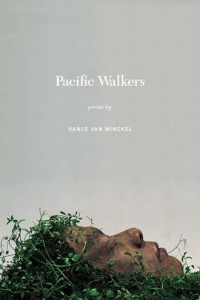 Pacific Walkers, Nance Van Winckel (University of Washington Press, 2013)
Pacific Walkers, Nance Van Winckel (University of Washington Press, 2013)
Judging by its cover, Nance Van Winckel’s Pacific Walkers—with its weed-wrapped corpse’s face—is a book suffused with fatal purpose. “I can keep anon in my heart,” she writes, and we hear the dispassionate journalism of mortality at work in every line. Van Winckel gives us a poetry spun from death certificates, from old antique store albums of family photographs—not shown, but vividly depicted—mixed with younger selves her memory reconstructs. Her poetry haunts us with quotidian reportage.
Indeed, Van Winckel has studied image and text dualists, and one recalls in this fine book—her ninth, and maybe her best—the lyrical documentaries of Walker Evans and James Agee, the singular duets with the pen and camera composed by Wright Morris, and the strange arrangements of such American testaments as Wisconsin Death Trip, as well as the street photography of Weegee and Helen Levitt. Pacific Walkers illustrates Greil Marcus’s view that such work is “A record of despair born of a single image.” Or Graham Greene’s assertion that “every artist’s voice must contain a sliver of ice.”
Take the insistence of the long-titled “I Have My Own Damned Family—Thank You Very Much—But Theirs Apparently Has Nobody”:
Bandaged. Gagged. In B-flat minor
and the tenth time in childbed,
which girl-face goes later
under what old-lady lace cap?
Here’s the brooch last seen five girls ago,
and if I come up kissing—someone, anyone—
I’m kissing through them.
The eyes. The eyes all have it.
The tangle of fates is both universal and idiosyncratic in these lines—like a single image, one brooch, passing through many lives. Van Winckel finds a way to let other people’s histories rub a reader raw, as if your own life were at stake.
There’s typographical implication, too. The poems are shaped at times—a visual delight—scripts for reading in an unusual way, little interior columns—like reading ground with rows of marble, or reading wind drifts. And though Van Winckel doesn’t show the photographs she writes from, she records their homey captions. From there you might turn a headlamp on the albums somebody in your family used to have. Everyone knows old family pictures, but it takes courage and an eye sharper than a camera to do with them what Van Winckel does:
Me in my chair
at an antiquated table—
my hereness dwindling
by the same cold degrees
as her goneness.
We’re all fading as quickly as old photographs, she says. At least a poet vanishes into her work. Van Winckel’s literacy—I mean the way her mind remembers books—extends beyond allusion, repossessing literary cadences as filtered through police archives and local lore. Some poems have the sound of a sod house woman reading Shakespeare—as in these lines from “My You Mother May I”:
Or mayn’t I call you Uncle? Prick me,
mightn’t you say I bleed? May the bleed
prick you me, Mother, and may it not so
my very you.
How do you read such lines? You have to let the poem conjure deep utterance, for starters, and remember, if you can, how your great-grandmother talked. What cadences everyone once had, before the voices behind the television said “speak this way.” Van Winckel makes it her scrupulous task to speak for those who could never, who can no longer, speak for themselves.
The lore you’ll find in Pacific Walkers is worth discovering. Police records of the unknown dead anchor those poems that conjure inky ghosts. One poem is based on this toe-tag of identification: “Found along the Spokane River at the foot of Clarke Avenue. Adult male, 60-70 years old. Decedent had been wearing a belt with a ‘G’ on it. This man had no real teeth. Fingerprints unobtainable.” Above this record, like a tombstone, is a honed poem that reads in part:
Will I be OK when
I’m dead?—doesn’t get
god as its answer. No
sir, not in these river weeds,
not from this warm mud
that coughs up
the toothless mouth.
Dorothea Lange’s notebooks quote Dostoyevsky to say, “There are moments when time suddenly gives place to eternity.” From the death notices of unidentifiable citizens, and the photographs of unnamable families, Van Winckel shows how we are bound to disappear, though some may be disinterred, and lyrically described. So this dark book is—I mean it—heavenly, especially if heaven is, in Borges terms, a proper library. Pacific Walkers should be in yours.
– Daniel Lamberton

